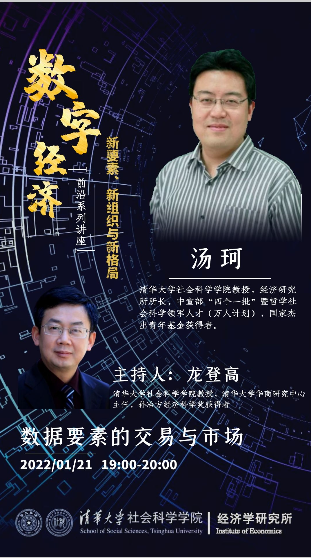
On January 21, Tang Ke, professor at the School of Social Sciences, Tsinghua University and director of the Institute of Economics, Tsinghua University, gave the Lecture 3 of Frontiers of Digital Economy Lecture Series, with the theme of transaction and markets of data elements. The lecture was presided over by Long Denggao, professor at the Institute of Economics, School of Social Sciences, Tsinghua University and director of the Center for Chinese Entrepreneur Studies, Tsinghua University.
First, Prof. Long reviewed the broadcast of the first two lectures, and introduced Prof. Tang’s outstanding achievements in the field of commodities and digital economy. Millions of viewer participation showed that the digital economy is inextricably linked to the lives of the masses. The Lecture Series is also one of the manifestations of the digital economy. Both the market and the central government attach great importance to the development of the digital economy.
In the lecture, Prof. Tang argued that data is the “oil” in the era of digital economy and the most important commodity. The flow and transaction of data elements is the new force driving economic growth. The Party and the government attach great importance to the construction of the big data market system. The prerequisite for data to become a production factor is the presence of trading markets. He summarized the main characteristics of data, such as infinite replicability, non-competitiveness, non-standardization, information carriers; moreover, it features complex ownership relationships, and has to do with privacy and national sovereignty. Different from general commodities, data is vulnerable to security threats in transactions because of the above characteristics. Prof. Tang summed up the external causes of unsuccessful data transaction from four aspects: data supply, data demand, government policy, and trust in data markets; and the internal causes of unsuccessful data transaction from four aspects: definition of data ownership, information attributes, the characteristics of replicability, non-competitiveness, non-standardization and strong heterogeneity. For the successful data transaction, the blood of the digital economy, he provided three basic solutions in terms of policy, technology and regulation. First of all, it is necessary to formulate supporting policies and systems to clarify the types of transactional data, the qualifications of traders, the ownership of transactional data, the duties and obligations of data holders, and the functions of the trading venue. Then he mentioned the incentives of data transaction, and the advantages of using data exchanges. For example, exchanges can protect the legitimate rights of buyers and sellers, and transactions are traceable and easily regulated. In order to encourage people to trade data in exchanges, it is necessary to solve the problem of insufficient supply of sellers, unactivated massive data resources, and strong heterogeneity, and to meet the diverse needs of buyers. At the same time, attention should be paid to the platform attributes of exchanges, gathering initial buyers and sellers to exchanges, and attracting users through network effects. Then Prof. Tang offered a technical solution. Public key cryptography is very important for data that does not involve privacy in data transaction. Private data that is difficult to transfer ownership requires the use of technologies such as private computing and federated learning. In addition, game theory, artificial intelligence, blockchain are also important technologies to support data transactions. After that, he indicated the importance of regulation in cracking down on illegal activities, especially black market transactions, and in the arbitration of transactions; and a regulatory sandbox should be built. At the end of the lecture, Prof. Tang also mentioned data market system, the basic functions of data market and the need to establish a national data infrastructure.
This Lecture Series is supported by Sina Finance, NetEase Finance, Chinese Headlines and KeAi’s Journal of Digital Economy.